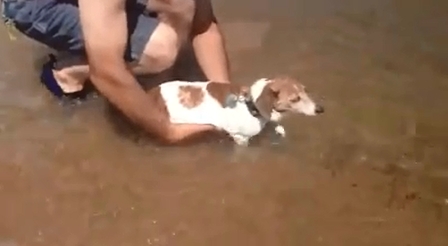Blindness Is Not A Disability
by
Jenny Kanieski
August 14, 2018

I've had the privilege of having two dogs in my lifetime so far, and they've had three things in common: both have been male, both have been rescue dachshunds, and both have been blind. That's where their similarities end.
Friends often express shock that I would want a blind dog – they think they're too much work, they're disabled, etc. Honestly, it's all I know ... and from what I've experienced, they adapt to their blindness much better than the humans around them tend to.
One thing to know: a blind dog is NOT disabled. They can do pretty much anything else a seeing dog can do; you just need to put in a tiny bit more effort.
Try not to move furniture around a lot in your living areas and keep their main paths clear. Check for things that could "trap" them that they won't be able to see - which is also a good idea to do for dogs that CAN see. For example, make sure curtain cords are high enough up that they don't accidentally get their necks caught in it. When walking, clear sticks out of their path that they probably would just walk through.
You'll also need to give more verbal cues than normal. The sooner you start, the easier it is as their sight deteriorates. My first dog, Willie, had zero sight by the end, but started off by seeing shadows and flashes of light. As we walked, I talked to him so he knew where I was. I said "up" when we went up a curb or if there was a big bump in the sidewalk. Likewise, I said "down" when we went down a curb. He knew those cues and jumped accordingly every time. He also dealt with extreme anxiety, since his past included quite a bit of abuse. So I made sure to talk constantly during our walks - just pointing out flowers, cars, etc. It kept him calm in unfamiliar environments. And if a loud bus or truck were coming, I sometimes would stop to crouch by him to pet him and let him know it was ok. The dachshund I have now, Sparky, is very different. He does not have abuse in his background and is not really afraid of anything. I still use cues to walk him, but he's pretty good without them. He does get confused walking new routes, so I talk him through it.
It's important when owning a blind dog, to keep their other senses sharp. I talked to a behavioralist with Willie and he suggested getting his sense of smell as sharp as possible. I think this is also a great idea even if your dog can see, since you never know what will happen in the future. So instead of just giving your dog a treat, hide a small treat in different areas of the room. You don't have to bury them under things - just place them in different spots on the carpet, then tell your dog to find their treat. It keeps their "sniffer" working and their senses sharp.
There are also many games you can play with blind dogs -- including catch -- with just a few changes to. In my next blog article, I'll explain some of the fun and games I play with Sparky.
I hope this helps alleviate any anxiety you may have about adopting a blind dog or if your current pet goes blind. With very little extra effort on your part, they and you can enjoy a long and fun existence together!

